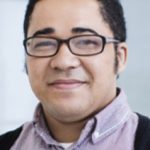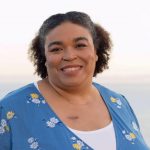Thank you to our 2021 plenary speakers! Please view the full program here.

Dr. Quentin Williams
University of the Western Cape, South Africa
Talk Title: “Undoing Coloured English: Toward a Sociolinguistics of Non-Racialism”
View the recorded talk here.
Abstract:
The challenge of contemporary South Africa is that of building a (post)nation of postracial equity in a fragmented world of a globalized ethical, economic and ecological meltdown. Yet, for some time now, language communities and individuals that had experienced linguistic discrimination under apartheid, and continue to experience so today, have been engaged in forms of non-racial struggles for sociolinguistic justice that aim to redefine their agency and voice, and thereby their linguistic citizenship. And central to such activism has been the use of global Englishes with local languages and varieties.
In my presentation, firstly, I put forward the argument that one particular variety of South African English, Coloured English (CE), while often used as a resource in the practice of non-racial sociolinguistic justice, continues to be a racializing technology that define discriminatory practices against language communities and individuals who supposedly speak the variety. In order to critically deconstruct the epistemic essentialism, racist discourses and discrimination of CE, I briefly revisit some key insights and positions from the global Englishes literature in relation to the homogenization image of linguistic imperialism studies and the supposed heterogeneity advanced in world English. I suggest that both the latter and former positions eschew true sociolinguistic justice.
Secondly, I propose a non-racial sociolinguistic justice framework by suggesting that an undoing of CE could be advanced through a study of acts of Linguistic Citizenship. The notion of Linguistic Citizenship here is defined as an approach to the study of language, race, identity, and linguistic justice that highlights the manifold ways multilingual speakers mediate and represent their agency and voice in situations defined by explicit and implicit racist, discriminatory practices. Linguistic Citizenship refers to ‘disruptive’ linguistic engagements with the coloniality of language that involves the expansion or retooling of available linguistic resources, and implicates language both as a target of ‘change’ and as a medium for (e.g. social/epistemic) transformation for speakers of global English.
Thirdly, I report on a qualitative study of young multilingual speakers’ remixing global English with CE, Kaaps, and Afrikaaps, by demonstrating and analyzing how those speakers, framed as “language technicians”, use those varieties as part of a critical historical process in everyday interactions. I pay particular attention to how those young “language technicians”, as a consequence of globalized language contact situations and their engagement with popular cultures, systematize CE into a metapragmatics of non-racial register forms and functions as tied to their acts of Linguistic Citizenship. I conclude the presentation, finally, by providing a number of suggestions on how to advance a non-racial sociolinguistic justice framework to better attend to matters of language, race and identity
.

Dr. Anne Charity Hudley
University of California, Santa Barbara
Talk Title: “Talking College: A Community Based Language and Racial Identity Development Model for Black College Student Justice”
Abstract:
Critical knowledge about language and culture is an integral part of the quest for educational equity and empowerment, not only in PreK-12 but also in higher education. As Black students transition from high school to college, they seek to add their voices and perspectives to academic discourse and to the scholarly community in a way that is both advantageous and authentic.
The Talking College Project is a Black student and Black studies centered way to learn more about the particular linguistic choices of Black students, while empowering them to be proud of their cultural and linguistic heritage. The Talking College Project is funded by the University of California-Historically Black College and University (UC-HBCU) Initiative and the National Science Foundation (NSF) Research Experience for Undergraduates (REU) Program. Students take introductory educational linguistics courses that examine the role of language in the Black college experience and collect information from college students through both interviews and ethnography. We value the perspectives of undergraduates from a range of disciplinary backgrounds as researchers, and we have a special focus on how our findings can immediately improve their own educational and linguistic experiences.
One key question of The Talking College Project is: how does the acquisition of different varieties of Black language and culture overlap with identity development, particularly intersectional racial identity development? To answer this question, we used a community based participatory research methodology to conduct over 100 interviews with Black students at several Minority-Serving Institutions, Historically Black College, and Predominantly White Universities. We also conducted ethnographies on over 10 college campuses. Based on information collected from the interviews and our ethnographies, it is evident that Black students often face linguistic bias and may need additional support and guidance as they navigate the linguistic terrain of higher education. We present themes and examples from the interviews that illustrate the linguistic pathways that students choose, largely without sociolinguistic knowledge that could help guide their decisions.
To address the greater need to share information about Black language with students, we highlight our findings from interviews with Black students who have taken courses in educational linguistics to demonstrate the impact of education about Black language and culture on Black students’ academic opportunities and social lives. We have a focus on how this information particularly influenced those who went on to be educators. These findings serve to help us create an equity-based model of assessment for what educational linguistic information Black students need in order to be successful in higher education and how faculty can help to establish opportunities for students to access content about language, culture, and education within the college curriculum. We address the work we need to do as educators and linguists to provide more Black college students with information that both empowers them raciolinguistically AND respects their developing identity choices.

